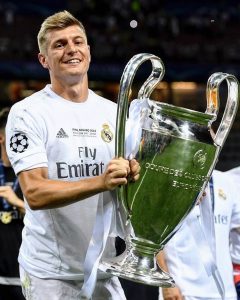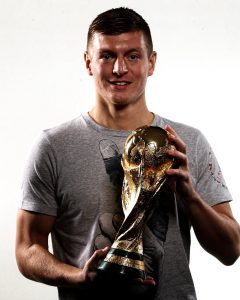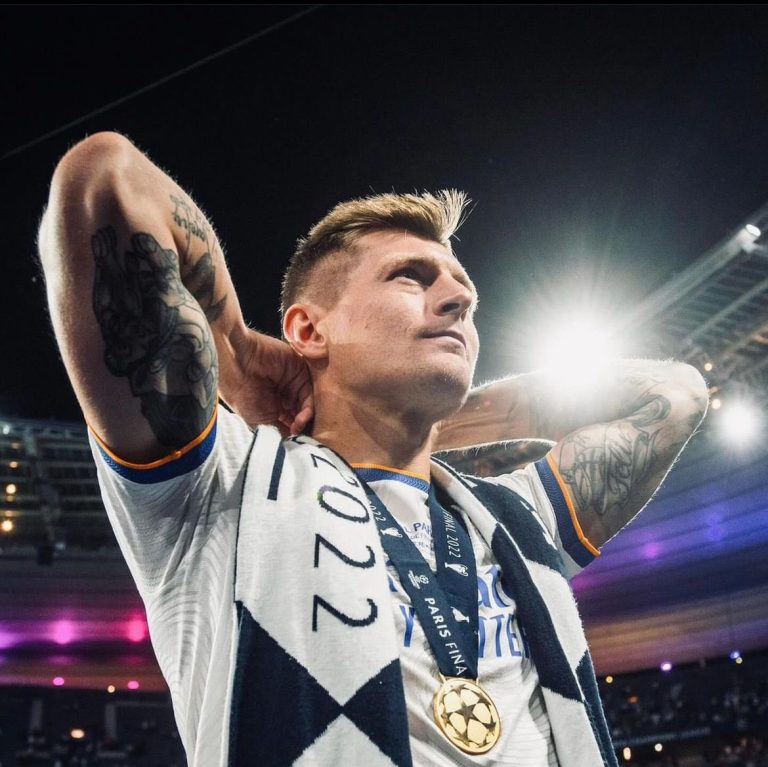Toni Kroos is a German professional footballer who plays as a midfielder for Real Madrid in La Liga and the Germany national team.
Renowned as one of the greatest midfielders in history, he is celebrated for his vision, passing, creativity, crossing, and expertise in set-pieces.
Early life and Education
Toni Kroos was born on January 4, 1990, in Greifswald, East Germany. He began playing football at a young age and joined the youth team of his local club, Greifswalder SV, at the age of seven. Kroos later moved to Bayern Munich’s youth academy in 2006, where he continued to develop his skills before making his professional debut for the club in 2007. As for education, his focus was primarily on football, and he pursued his career in the sport rather than traditional academic paths.
Career

Toni Kroos began his football career with local club Greifswalder SC before transferring to the youth team of Hansa Rostock. In 2006, he joined Bayern Munich’s youth setup, missing up to 40 days of school annually due to training.
During the 2007–08 season, at 17, Kroos was promoted to Bayern’s senior team. He made an impressive Bundesliga debut on September 26, 2007, in a 5–0 victory over Energie Cottbus, providing two assists for Miroslav Klose within 18 minutes of coming on as a substitute. At 17 years and 265 days old, he was Bayern’s youngest debutant, a record later broken by David Alaba in 2010. On October 25, Kroos secured a win against Red Star Belgrade in his UEFA Cup debut, assisting a goal and scoring the winner in stoppage time. He finished the season with 20 appearances for Bayern, including six starts, and scored three goals in 12 appearances for Bayern Munich II in the Regionalliga Süd.
In the 2008–09 season, despite starting Bayern’s opening Bundesliga match against Hamburger SV, Kroos had limited playing time. He made his UEFA Champions League debut on November 5, 2008, as a late substitute against Fiorentina.
On January 31, 2009, Kroos was loaned to Bayer Leverkusen for 18 months to gain first-team experience. He debuted on February 28 in a 1–0 loss to Hannover 96 and made his first Bundesliga start on April 12, assisting a goal in a 1–1 draw with Werder Bremen. He scored his first Bundesliga goal on April 18 in a 2–1 defeat to VfL Wolfsburg. Kroos also appeared as a late substitute in the 2009 DFB-Pokal Final, where Leverkusen lost 1–0 to Werder Bremen. During the 2008–09 season, Kroos made 13 appearances for Leverkusen in all competitions, scoring once.
In the 2009–10 season, Kroos became a regular starter for Leverkusen, missing only one Bundesliga match. He scored five goals and provided four assists between matchdays 16 and 20, earning consecutive “Player of the Month” awards from kicker for December 2009 and January 2010. He ended the season with nine goals and 12 assists from 33 matches.

In the summer of 2010, following his loan at Bayer Leverkusen, Toni Kroos returned to Bayern Munich. When asked about his prospects with Bayern, who had finished as runners-up in the previous season’s Champions League, Kroos declared, “I want to play as often as possible!” On August 16, 2010, he scored in a 4-0 victory over Germania Windeck in the first round of the DFB-Pokal. His first league goal for Bayern came on October 29, 2010, in a 4-1 win against SC Freiburg. Throughout the 2010–11 season, Kroos was a regular starter, ending the season with 37 appearances in all competitions.
In the 2011–12 season, under Jupp Heynckes, Kroos became a first-choice player for Bayern, forming a strong midfield partnership with Bastian Schweinsteiger. He played 51 matches across all competitions that season, including the 2012 UEFA Champions League Final, where Bayern lost to Chelsea on penalties at the Allianz Arena.
Kroos was instrumental in Bayern’s treble-winning 2012–13 season. As the most advanced member of a midfield trio with Schweinsteiger and Javi Martínez, Kroos scored three goals in the first four Bundesliga matches and netted his first Champions League goal against Valencia. However, an injury in the Champions League quarter-final first leg against Juventus sidelined him for the rest of the season, causing him to miss Bayern’s victories in the 2013 UEFA Champions League Final, the 2013 DFB-Pokal Final, and the last seven Bundesliga matches.
Kroos returned to fitness for the 2013–14 season, participating in the German Super Cup and the UEFA Super Cup. On October 4, 2013, he scored his first goal of the season in a 1-1 draw against Bayer Leverkusen. He played in the 2013 FIFA Club World Cup, featuring in the 3-0 semi-final win over Guangzhou Evergrande and the final victory against Raja Casablanca. On February 19, 2014, Kroos scored in a 2-0 Champions League win against Arsenal. He also scored in a 3-1 win over Hertha BSC on March 25, as Bayern clinched the Bundesliga title.
Before joining Real Madrid, Kroos had agreed to join Manchester United under David Moyes. However, after Moyes was sacked and Louis van Gaal took over, the deal fell through. During the 2014 World Cup, Kroos received a call from Carlo Ancelotti, leading to his transfer to Real Madrid on July 17, 2014. He signed a six-year deal for an undisclosed fee, reported to be between €24 and €30 million. Greifswalder SV 04, the successor to his first youth team, received €60,000 from the transfer.
Kroos became the ninth German player to join Real Madrid. During his presentation in front of 8,000 supporters, he described Real Madrid as the “biggest club in the world” and “a cut above Bayern.” He debuted against Sevilla in the 2014 UEFA Super Cup, winning his first trophy with Real Madrid. He formed a midfield trio with James Rodríguez and Luka Modrić, contributing to a 22-game winning streak. On November 8, he scored his first goal for Real Madrid in a 5-1 win over Rayo Vallecano. He helped the team win the 2014 FIFA Club World Cup and was named to the FIFPro World XI and the UEFA Team of the Year.
From 2015 to 2019, under managers Rafa Benítez and Zinedine Zidane, Kroos remained a key player. He was integral to Real Madrid’s Champions League victories in 2015–16, 2016–17, and 2017–18, becoming the first German to win the Champions League with two clubs and three times overall. In 2016, he extended his contract until 2022 and was once again named to the FIFPro World XI and UEFA Team of the Year.
In the 2018 FIFA Club World Cup, Kroos won his record fifth title. He extended his contract with Real Madrid until 2023 on May 20, 2019. During the 2019–20 season, Kroos scored several important goals, including a direct corner kick goal in the Supercopa de España Semi-final and a goal in the league draw against Celta Vigo. He played a crucial role in Real Madrid’s 10-game winning run that secured the 2019–20 La Liga title.
From 2021 onwards, Kroos continued to achieve success, scoring his first El Clásico goal from a free-kick and winning his fifth Champions League title in the 2021–22 season. He also won the UEFA Super Cup in 2022, the FIFA Club World Cup in 2023, and his first Copa del Rey title in May 2023. On June 21, 2023, he extended his contract with Real Madrid until June 2024.
On May 21, 2024, Kroos announced that he would retire from club and international football after UEFA Euro 2024.
International In the 2007 FIFA U-17 World Cup, Toni Kroos was awarded the Golden Ball as the tournament’s best player and the Bronze Shoe after scoring five goals. He made his debut for the national U-21 team on 5 September 2008, scoring the opening goal in a Euro U-21 Championship qualifier against Northern Ireland. Kroos scored his second goal for the U-21s in a 1–0 win over Italy with a precise long-range shot. Despite his strong performances, coach Horst Hrubesch surprisingly left him out of the squad for the Euro 2009, which Germany won.
In the 2007 FIFA U-17 World Cup, Toni Kroos was awarded the Golden Ball as the tournament’s best player and the Bronze Shoe after scoring five goals. He made his debut for the national U-21 team on 5 September 2008, scoring the opening goal in a Euro U-21 Championship qualifier against Northern Ireland. Kroos scored his second goal for the U-21s in a 1–0 win over Italy with a precise long-range shot. Despite his strong performances, coach Horst Hrubesch surprisingly left him out of the squad for the Euro 2009, which Germany won.
In January 2010, Kroos was called up to the senior Germany team for a training session and was subsequently included in the squad for a friendly against Argentina on 3 March 2010, marking his debut for the national side. Kroos was part of Joachim Löw’s 23-man squad for the 2010 FIFA World Cup in South Africa. He made his World Cup debut in the final group-stage match against Ghana, substituting in for Bastian Schweinsteiger in the 80th minute. Kroos also made substitute appearances in the quarter-finals against Argentina, the semi-finals against Spain, and the third-place play-off against Uruguay.
Kroos became a regular starter in Germany’s qualification campaign for UEFA Euro 2012, playing in eight out of ten games as Germany won all their qualifiers to top Group A. He scored his first two international goals in friendlies against Poland and Ukraine, earning praise from coach Joachim Löw for his technical excellence and progress.
At Euro 2012, Kroos appeared as a substitute in all three of Germany’s Group B matches. In the semi-final against Italy, Löw controversially chose Kroos to man-mark Italy’s playmaker Andrea Pirlo. The decision was criticized as Germany lost 2–1.
During Germany’s 2014 World Cup qualifying campaign, Kroos scored his first two competitive international goals in a 6–1 win over the Republic of Ireland. He was named in Germany’s squad for the 2014 World Cup. In the opening match, a 4–0 win over Portugal, Kroos assisted Mats Hummels for Germany’s second goal. He provided the assist for Hummels’ goal against France in the quarter-final and scored twice in Germany’s 7–1 semi-final win over Brazil, earning man of the match honors. Kroos was nicknamed “Garçom” by Brazilians for his precise passing.
On 11 July, Kroos was shortlisted for FIFA’s Golden Ball award for the tournament’s best player. The Castrol Performance Index rated him as the best player at the 2014 World Cup, with a score of 9.79 out of 10. Kroos is the only player from the former East Germany to win the World Cup.
Kroos was included in Germany’s final 23-man squad for the 2018 FIFA World Cup. On 23 June, he scored a stoppage-time free-kick to secure a 2–1 victory over Sweden, keeping Germany’s hopes alive. However, Germany was eliminated after a 2–0 defeat to South Korea in their final group stage match.
On 13 October 2020, Kroos played his 100th match for Germany against Switzerland in the UEFA Nations League.
On 19 May 2021, Kroos was selected for the UEFA Euro 2020 squad. Following Germany’s 2–0 loss to England in the Round of 16, Kroos announced his retirement from international football, citing a desire to focus on his club career and family. Despite criticism from figures like Uli Hoeneß and Lothar Matthäus regarding his playing style, Kroos emphasized that his decision was based on personal priorities.
On 22 February 2024, Kroos announced his return to the German national team after being approached by new manager Julian Nagelsmann. He was called up for the March 2024 window and provided an assist just seven seconds into his international return against France on 23 March 2024.
Personal life He has a younger brother, Felix Kroos, who also pursued a career in professional football. Their father, Roland Kroos, worked as a youth coach for Hansa Rostock. During his school years, Kroos was an average student who devoted much of his time to practicing football. Despite his academic mediocrity, he was well-behaved in class and well-liked by his peers.On 13 June 2015, Kroos married his long-term girlfriend, Jessica Farber. The couple has two sons and a daughter. Additionally, Kroos owns a house on the island of Mallorca.
He has a younger brother, Felix Kroos, who also pursued a career in professional football. Their father, Roland Kroos, worked as a youth coach for Hansa Rostock. During his school years, Kroos was an average student who devoted much of his time to practicing football. Despite his academic mediocrity, he was well-behaved in class and well-liked by his peers.On 13 June 2015, Kroos married his long-term girlfriend, Jessica Farber. The couple has two sons and a daughter. Additionally, Kroos owns a house on the island of Mallorca.
Legacy
Kroos leaves behind a legacy marked by excellence and success in both domestic and international football. From his early days at Bayern Munich to his illustrious tenure at Real Madrid, Kroos showcased remarkable skill and versatility in midfield, earning accolades and trophies along the way. His ability to control the game with precise passing, vision, and leadership qualities made him a vital asset for both club and country.
Notably, Kroos became the first German player to win the UEFA Champions League with two different clubs, cementing his status as one of the game’s elite midfielders. His six FIFA Club World Cup titles, five Champions League titles, and domestic league triumphs underscore his unparalleled success at the highest level of the sport.
Beyond his on-field achievements, Kroos’ impact extends to his role as a mentor and inspiration to aspiring footballers. His professionalism, work ethic, and dedication serve as a model for future generations, leaving a lasting imprint on the sport.
As he bids farewell to club and international football after UEFA Euro 2024, Kroos leaves behind a legacy that will be remembered and celebrated for years to come.
Net Worth
Undisclosed


